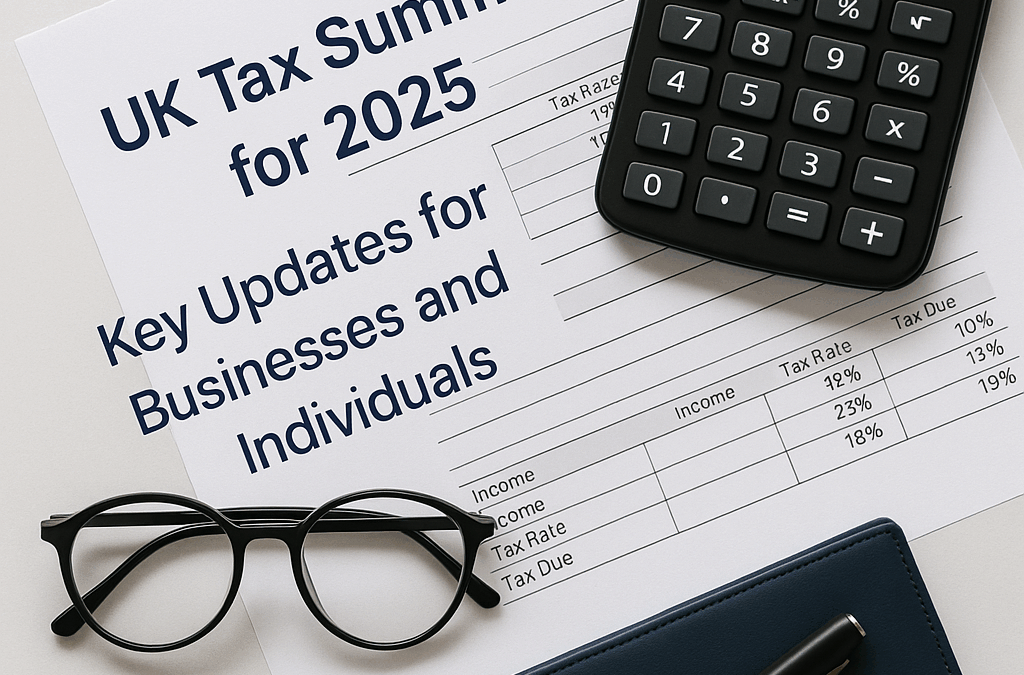As we enter the 2025/26 tax year, it’s important for businesses and individuals across the UK to understand the latest tax updates and how they may affect financial planning. Whether you’re a sole trader, limited company owner, or individual taxpayer, staying informed can help you stay compliant and take advantage of any new tax-saving opportunities.
1. Personal Tax Allowances and Rates
Personal Allowance (unchanged):
The standard personal allowance for 2025/26 remains at £12,570, meaning you can earn this amount before paying any income tax.
Income Tax Bands in England, Wales, and Northern Ireland:
-
Basic Rate (20%): £12,571 to £50,270
-
Higher Rate (40%): £50,271 to £125,140
-
Additional Rate (45%): Above £125,140
Note: Scotland has different income tax bands and rates.
National Insurance Contributions (NIC):
As part of the government’s effort to reduce the tax burden:
-
The employee NIC rate has been reduced further to 6%, following cuts in 2024.
-
Self-employed Class 4 NICs are now at 6%, and Class 2 NICs have been abolished entirely from April 2025.
2. Dividend and Capital Gains Tax Changes
Dividend Allowance:
-
The tax-free dividend allowance has been reduced to £500 (down from £1,000 in 2024).
Dividend tax rates remain unchanged:-
Basic Rate: 8.75%
-
Higher Rate: 33.75%
-
Additional Rate: 39.35%
-
Capital Gains Tax (CGT):
-
The CGT annual exempt amount is now £3,000 (previously £6,000 in 2024).
-
CGT rates:
-
Basic rate taxpayers: 10% (or 18% for residential property)
-
Higher/additional rate taxpayers: 20% (or 24% for residential property)
-
3. Corporation Tax
-
For companies with profits above £250,000, the main corporation tax rate remains at 25%.
-
Companies with profits under £50,000 pay the small profits rate of 19%.
-
Profits between £50,000 and £250,000 are subject to marginal relief, creating a tapered rate between 19% and 25%.
4. VAT and Thresholds
-
The VAT registration threshold has increased to £90,000 (from £85,000).
-
Deregistration threshold is now £88,000.
5. Making Tax Digital (MTD)
From April 2026, Making Tax Digital for Income Tax Self Assessment (MTD for ITSA) becomes mandatory for sole traders and landlords earning over £30,000. While it’s not compulsory this year, it’s a good time to prepare:
-
Use MTD-compliant software like QuickBooks, Xero, or FreeAgent.
-
Keep digital records and submit quarterly updates to HMRC.
6. Pensions and Savings
-
The Annual Allowance for pension contributions remains at £60,000.
-
The Lifetime Allowance has been fully abolished in 2025, providing more flexibility for high earners.
7. Key Deadlines for 2025
| Deadline | Action |
|---|---|
| 31 Jan 2025 | Self Assessment tax return and payment for 2023/24 |
| 6 Apr 2025 | Start of 2025/26 tax year |
| 31 Jul 2025 | Second payment on account for Self Assessment |
| 5 Oct 2025 | Register for Self Assessment if newly self-employed |
| 31 Oct 2025 | Paper tax return deadline |
| 31 Jan 2026 | Online tax return and payment deadline for 2024/25 |
How We Can Help
At Greystone Accountants, we help businesses and individuals across Birmingham, Walsall and beyond stay compliant and tax-efficient. Whether you need help with tax planning, your Self Assessment return, or business accounts, we can provide tailored advice.
👉 Book a free consultation today or get an instant accounting quote through our interactive form.


Recent Comments